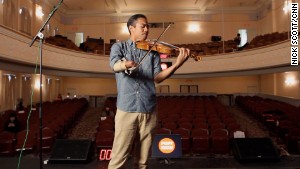Anantawan is one of the world's most accomplished young violinists. He has performed at the White House, at the Vancouver Winter Olympics, for Pope John Paul II, for Christopher Reeve and most recently for the Dalai Lama during a private recital at MIT. Anantawan played a piece by Bach, and when he finished, the Tibetan Buddhist leader approached him.

"He put my hands together, and put his hands around mine, and our foreheads touched for six or seven seconds," Anantawan said. "And I'm just thinking to myself, 'My goodness, where has this instrument and music taken me?' I feel tremendously blessed to have had experiences like that."
Anantawan's disability has been with him since birth. Doctors think the umbilical cord wrapped around his hand in the womb, cutting off the blood supply and keeping it from growing properly. To compensate, he uses a simple prosthesis called a spatula, which grips the violin bow.

Anantawan on the stage of the Camden Opera House in Camden, Maine, where he spoke at the PopTech conference.
In recent years, Anantawan has devoted his career to using adaptive technology -- from prosthetic devices like his own to sophisticated computer software -- to aid aspiring young musicians in overcoming a wide range of disabilities. By helping them make music, he believes this technology can help "reveal the inner humanity" of disabled children who struggle to express themselves through other means.
"Accessibility is not an act of charity," Adrian told an audience last summer during a TEDx talk in suburban Boston, where he is now an orchestra conductor at a charter school. "It's one of lifting the ceiling of potential development so that all children can explore this world, but also possibly create new ones."
A 'sonic fingerprint'
Born of Thai-Chinese ethnicity, Anantawan grew up in Toronto. With only one hand, many childhood milestones -- learning to tie shoes, sharpen a pencil in class, ride a bike -- were difficult for him. Classmates made him feel different.
"Growing up without an arm -- it seems trivial now, but when you're in grade one or two, kids can exclude you on many different levels," he said during an interview last fall at the annual PopTech conference in this picturesque Maine seaside town.
By the time he was 9, his parents decided he should learn a musical instrument. The recorder was out, because it's difficult to adapt for two hands. The trumpet was too loud, and so were the drums. Little Adrian didn't have much of a singing voice. So his mother decided on the violin.
His parents took the instrument to a rehabilitation center, where they adapt prosthetics to meet the needs of disabled children. A few months later, engineers there produced a customized device out of plaster, aluminum and Velcro straps. Eighteen years later, he's still wearing the same one.
"Little did my parents know that they had invited a dying cat into their home for the first six months in the form of 'Twinkle, Twinkle, Little Star,' " said Anantawan in the TEDx talk, squeaking out the melody on his violin.
For a boy with one hand, music became a great equalizer. Suddenly, he could do something the same way as his classmates.
"I had this adaptation. It did look different. But what came out, in terms of the sound from the instrument, was exactly the same as theirs. And we were all trying to make music together," Anantawan said. "Music was my way of sharing my personality with the world. I was very shy. I didn't talk very much. And the instrument, and playing music, helped me come out of my shell."brandon griggs cnn
No comments:
Post a Comment